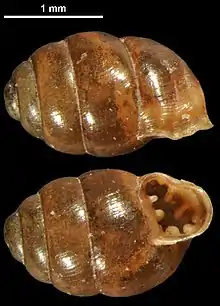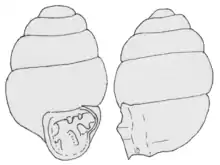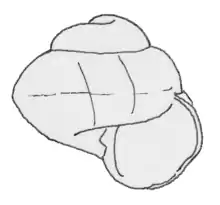Vertigo antivertigo
Vertigo antivertigo is a species of minute air-breathing land snail, a terrestrial pulmonate gastropod mollusc or micromollusc in the family Vertiginidae, the whorl snails. [3]
| Vertigo antivertigo | |
|---|---|
 | |
| shell of Vertigo antivertigo (specimen at MNHN, Paris) | |
 | |
| Five shells of Vertigo antivertigo, scale in mm | |
| Scientific classification | |
| Domain: | Eukaryota |
| Kingdom: | Animalia |
| Phylum: | Mollusca |
| Class: | Gastropoda |
| Subclass: | Heterobranchia |
| Order: | Stylommatophora |
| Family: | Vertiginidae |
| Subfamily: | Vertigininae |
| Genus: | Vertigo |
| Species: | V. antivertigo |
| Binomial name | |
| Vertigo antivertigo (Draparnaud, 1801)[2] | |
| Synonyms | |
| |
Distribution
This species occurs in countries and islands including:


Shell description
The shell is rimate, oval, ventricose, nearly smooth, glossy, amber-brown or nearly chestnut, slightly transparent, outlines very convex. Whorls are rather convex, the last somewhat compressed below, with an impression over the lower palatal fold, a moderately developed, opaque crest behind the peristome; and a very deep impression between the crest and the point of the outer lip.[6]
Aperture having 6 principal and usually several smaller teeth: parietal lamella rather long; angular and infraparietal short and smaller. Columellar lamella large, ascending inwardly. Upper and lower palatal folds strong, the lower longer. Basal fold stout, in a subcolumellar position. Usually there are small suprapalatal and infrapalatal denticles. Peristome is thin, a little expanded, the outer margin biarcuate, with a median entering angle. Palatal callus is well developed.[6]
The width of the adult shell varies from 1.2 to 1.4 mm, the height from 1.95-2.25 mm.[6]
References
This article incorporates public domain text from reference.[6]
- Neubert, E. (2011). "Vertigo antivertigo". IUCN Red List of Threatened Species. 2011: e.T156370A4934184.
- Draparnaud J. P. R. 1801. Tableau des mollusques terrestres et fluviatiles de la France. pp. [1-2], 1-116. Montpellier, Paris. (Renaud; Bossange, Masson & Besson).
- MolluscaBase eds. (2023). MolluscaBase. Vertigo antivertigo (Draparnaud, 1801). Accessed through: World Register of Marine Species at: https://www.marinespecies.org/aphia.php?p=taxdetails&id=1050659 on 2023-02-07
- Balashov I. & Gural-Sverlova N. 2012. An annotated checklist of the terrestrial molluscs of Ukraine. Journal of Conchology. 41 (1): 91-109.
- Pokryszko B. M., Auffenberg K., Hlaváč J. Č. & Naggs F. (2009). "Pupilloidea of Pakistan (Gastropoda: Pulmonata): Truncatellininae, Vertigininae, Gastrocoptinae, Pupillinae (In Part)". Annales Zoologici 59(4): 423-458. doi:10.3161/000345409X484847.
- Pilsbry H. A. & Cooke C. M. 1918-1920. Manual of Conchology. Second series: Pulmonata. Volume 25. Pupillidae (Gastrocoptinae, Vertigininae). Philadelphia. page 163–164.
- Bank, R. A.; Neubert, E. (2017). Checklist of the land and freshwater Gastropoda of Europe. Last update: July 16th, 2017
- Connolly, M. (1939). A monographic survey of South African non-marine Mollusca. Annals of the South African Museum. 33: 1-660. page(s): 403
- Sysoev, A. V. & Schileyko, A. A. (2009). Land snails and slugs of Russia and adjacent countries. Sofia/Moskva (Pensoft). 312 pp., 142 plates.
- erbert, D.G. (2010). The introduced terrestrial Mollusca of South Africa. SANBI Biodiversity Series, 15: vi + 108 pp. Pretoria.
External links
- 801) Draparnaud, J. P. R. (1801). Tableau des mollusques terrestres et fluviatiles de la France. Montpellier / Paris (Renaud / Bossange, Masson & Besson). 1-116.
- Mousson, A. (1873). Coquilles recueillies par M. le Dr Sievers dans la Russie Méridionale et Asiatique. Journal de Conchyliologie, 21 (3): 193-230, pl. 7-8. Paris
- Pokryszko, B. M., Auffenberg, K., Hlaváč, J. Č. & Naggs, F. (2009). Pupilloidea of Pakistan (Gastropoda: Pulmonata): Truncatellininae, Vertigininae, Gastrocoptinae, Pupillinae (In Part). Annales Zoologici. 59(4): 423-458
- Schileyko, A. A. & Rymzhanov, T. S. (2013). Fauna of land mollusks (Gastropoda, Pulmonata Terrestria) of Kazakhstan and adjacent territories. Moscow-Almaty: KMK Scientific Press. 389 pp
- Vertigo antivergo at Animalbase taxonomy,short description, distribution, biology,status (threats), images
- MNHN, Paris: specimen
